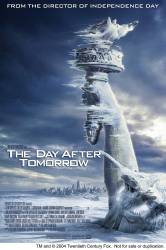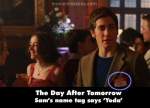Question: Why did Sam insist on going to the library? Laura suggests they should just go back to the apartment, and Sam says, "They have to get higher," but the library doesn't appear to be very high at all. At this point, none of them know about the freezing temperatures, so you can't even say that he knew there were loads of books to burn for heat.
Question: Does anyone know what happened to JD's brother in Philadelphia? As far as I know, nothing is mentioned by anyone once they are trapped in the library.
Question: Why would Sam and his friends go to the library?
Answer: It was the closest building they could access. While the smarter move would have been to just go back to JD's apartment (which Brian and Laura suggest) it may have been too far a walk to get out of the flooding streets.
Why did they burn the books and not the wooden shelves that the books were on?
As for burning books rather than shelves, it was just easier. They would have had to expend more energy to break down the shelves into manageable size.
They burn books instead of the wooden shelves because burning books is a quicker and more efficient way to generate heat in a desperate situation, as the paper readily catches fire and produces a substantial amount of heat compared to solid wood, which might take longer to burn properly.
Question: I noticed the librarian, Judith, never appears after the retrieval of penicillin, I say this because I missed a tid-bit of the film after they acquired it. Is she there just camera shy or did she freeze?
Answer: She is indeed alive. Take a close look at the scene when Jack Hall arrives. Judith appears in that scene.
Question: Why did the big freeze-over happen during the eye of the storm, and why was it then safe for Dr. Hall to continue his journey north?
Answer: Earlier in the film, Hall's team analyzes the Scotland helicopter incident and determines that it was caused by a new meteorological phenomenon like a reverse hurricane. Air from the upper atmosphere was pulled down to ground level, but remained at the temperature of the troposphere (-150 F). The eye of the storm is where the vortex from the troposphere to the surface terminates, with the air then moving outward with the storm and warming to ground temperature. This is why the freezing happens during the eye of the storm. Dr. Hall is safe continuing after the eye passes as conditions will get steadily better because he is passing out of the storm, until it abruptly ends overnight.
Question: Did Frank actually die when he cut the rope? Did they not find another way into the Galleria to check on him in case he only had a fractured leg, or did they just decide to leave him?
Answer: Frank fell several stories through the skylight of a mall. Even if he somehow survived the fall, Jack and Jason would have no way of rescuing him as the mall was buried under several meters of snow and the glass roof was precarious at best. Frank sacrificed himself so Jack could go to New York and rescue his son.
Question: Why did the Scottish scientists run out of petrol? They even say "We've got our own gene and enough tea and biscuits to sink a ship." Surely they'd have stocked up on petrol for that generator too?
Answer: For an average period of time, not for the second ice age. They didn't figure on it hitting so fast and quickly stranding them there.
Question: When New York got hit with a tidal wave and Sam asked the receptionist where the "pay phones are?" Why didn't he just ask to use one of the 100s of phones throughout upper parts of the building? I'm sure a verbal warning was the last thing the receptionist mind, I mean there was a freaking oil tanker floating up the street. (00:25:00 - 01:00:00)
Answer: The power had been knocked out meaning anything more than a basic telephone wouldn't be able to work. Payphones would get their power directly from the phone line and given how essential phones are to call emergency services, phone lines usually have backup power sources (batteries, generators etc) in case of power outages.
Question: After Frank fell to his death, Jack and Jason stay in the tent for the night. Jason has things dropped from his bag, and he puts something (looks like a tin can maybe?) into the bag right away and Jack notices it and stares at him with some kind of betrayed looks on his face. Does it imply Jason was keeping food or water for himself behind Jack's back? Please explain the scene.
Chosen answer: It's their last can of Sterno...basically, canned jellied alcohol (or ethanol) that can be lit on fire and used as a localized heat source. It's common amongst campers, as it can be used as a burner or to heat a small tent, which is how they've been using it. The look they exchange is an unspoken acknowledgement that if they don't get more fuel, or find somewhere warm, they will freeze to death soon.
Question: Is the Statue of Liberty strong enough to survive that amount of water pressure, or should it have buckled/bent/been destroyed completely?
Chosen answer: The Statue of Liberty *should* have been knocked over by the tidal wave, but the director wanted to create a symbol of American values of "standing up" and persevering.
Question: After all of the snow melts, wouldn't it go into the ocean and cause the same disruption as before?
Answer: Who says it's going to melt? The point of the movie is that global warming has upset the ocean currents and triggered a new Ice Age. The snow is going to be there for a long time to come yet - say 10,000 years?
At the end of the movie the astronaut reports that he 'has never seen the air so clear.' Perhaps suggesting that the storm has cleared the air. So maybe it does melt. Also, to create 15 feet of snow on top of 1/2 the world, the air moisture would have to come from somewhere, the oceans. And thus bringing back the pre-storm sea levels when melted.
Maybe it will be there for a long time unless we introduce gases in the northern hemisphere re trapping the heat, and melting the snow.
Question: What was the point of Jack going to NY? What did he actually achieve? They would have sent helicopters to look for survivors anyway...?
Answer: He was a father searching for his only son. What parent wouldn't do that. Besides, the government decided to evacuate all the southwest of the country, leaving the others to fend for themselves. Like the General said, in the conference room, as in war, we save only the ones we can save. When the cold burst hit everywhere, it was assumed everyone else in the country died. It was only after survivors were found in New York that they discovered all the others.
Question: How did the wolves escape?
Answer: A tree broke the wall of their enclosure at the zoo and they climbed it to freedom.
Question: Most tsunami are caused by earthquakes underwater that trigger a huge wave. However, there are no earthquake-causing fault lines anywhere near New York City. So what caused the tsunami?
Answer: That's not a tsunami - it's a catastrophic rise in sea level caused by the disruption in the ocean's balance. Same basic effect, different cause.
I say it's a storm surge.
Question: At the beginning of the film, Jack Hall quickly explains how global warming could cause an ice age by altering the global ocean currents. The explanation is short and I didn't catch all of it. Could someone explain in more detail, preferably as simply as possible?
Chosen answer: Global warming melts the icecaps, releasing millions of tons of fresh water into the oceans. This upsets the delicate environmental balance of the oceans, leading to the ocean currents stopping. It's these currents that carry warm water up into the Northern Hemisphere, causing our temperate climate. The currents stop, everything cools down, fast.
Question: How is it possible that at the end of the film, when the helicopters are arriving to New York, many people are coming out of the buildings. Aren't they supposed to be frozen?
Answer: The people in the library were able to survive by making fires and so on - obviously these other people were equally resourceful.







Answer: Possibly because it was the closest building with height to it as they are about to be hit by a gigantic wave of water. There was no snow yet, so I don't believe burning books or snow was on anybody's mind yet. It turned out to be a great idea as snow soon starts to fall and those books were literally a life saver.
Susan D. Santos